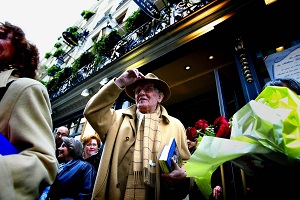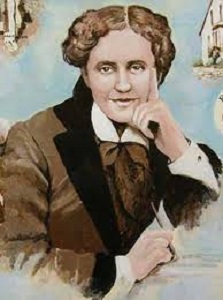De Nederlandse literatuurcriticus, essayist en letterkundige Kees Fens werd geboren in Amsterdam op 18 oktober 1929. Zie ook alle tags voor Kees Fens op dit blog.
Uit: Het beslissende boek
“Ik sprak zojuist over een tweede helft van de cirkel. Daarmee wil ik ook aangeven dat wie leest zichzelf uitbreidt, en wel met een gebied dat ineens ook zijn eigen gebied blijkt te zijn. Dat echt mooie, wat is dat? Ik geloof dat je dat kunt omschrijven als het passende, datgene wat voor jou is, het eigene. Op datzelfde moment wordt het boekenbestand opgedeeld in drie soorten, t.w. mijn boeken, jouw boeken en zijn of haar boeken; die drie zullen elkaar nooit ontmoeten, en dat is ook het fijne ervan. Nog een precisering van het beeld van die halve cirkel: die bestaat overigens natuurlijk wel uit heel veel kleine segmenten: want eenzijdig is de tweede helft vaak allerminst, al hebben de onderdelen ervan vaak wel veel met elkaar te maken.
Om te verduidelijken wat zich bij zo’n lezer afspeelt, wil ik hier nog enkele andere omschrijvingen aanvoeren, zoals: ‘Weggaan en toch thuiskomen’. Weggaan, naar plaats, tijd, en naar mensen en thuiskomen in andere tijden, op andere plaatsen, bij andere mensen. Ook heb ik het wel, vanuit het boek zelf denkend, als volgt voorgesteld: daar, ginds naar plaats of tijd genomen – vroeger dus – is met mij als lezer rekening gehouden. Het meest fascinerende is wel dat je als kind nog altijd – en hoe dat komt, wil ik straks proberen te verklaren – meer gestalten hebt en in meer tijden kunt bestaan.
Eindelijk vind je, zo is althans mijn ervaring, alles beschreven waarvan je altijd al gedacht hebt dat het bestond. Er ontstaat een soort bewustwording van bi-locatie en pluri-locatie. Soms lijkt het erop dat je – en dat is een heel sterke sensatie – uit die wereld van het boek hier en nu te vondeling bent gelegd. Daarmee wordt lezen de meest persoonlijke bezigheid; en daar komt geen opvoeder aan te pas, want jij bepaalt zelf welke jouw boeken zijn.
Waaruit bestaat dan de taak van de opvoeder? Vooral uit het niet opvoeden. Hoogstens levert de opvoeder de mogelijkheden tot keuze van die boeken. Dat hij dan ook de lezer beïnvloedt is niet juist, maar die eer moeten wij hem gunnen, want deze periode is zijn schijnbare glorietijd. Hij is de leverancier, de aanbrenger van de boeken die beslissend kunnen worden; met opzet druk ik mij hier erg voorzichtig uit. Die opvoeder werkt mee – of hij werkt niet mee: het kan natuurlijk ook dat de boeken er niet bij zijn – aan het mogelijk vóórkomen van het toeval; en het is helaas waar: van het toeval hangt alles af. Wie het treft, is dan zeer gelukkig.”

Kees Fens (18 oktober 1929 – 14 juni 2008)


